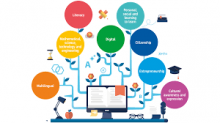Some definitions:
Learning approaches are the methods (tools and processes) used for designing the learning experiences pupils have.
Learning environments are the particular learning arrangements for a group of learners in context over time, in which teh learning taking place is an integral part.
In practice, both concepts are closely linked.
KeyCoNet identified learning approaches that support key competences:
Active role of the learner
Individual and collaborative learning
Inquiry and project-based learning
Experiental learning
Cross-discipline cooperation
Language aware schools
Optimal use of digital technologies
Whole school approach to wellbeing
And examples of learning environments:
Adapting existing or creating new learning spaces;
Learning in sites outside of schools (theaters, parks, enterprises, …);
Learning in and with different countries;
Cross-sectoral partnerships (arts, sports, research,..);
Learning in digital environments.
Projects and policy initiatives
The conference paper identifies current projects for each category of learning approaches and learning environments. Some of them are on exhibition.
The paper also presents examples of policy initiatives that work well in supporting key competences development at a systemic level and with a clear impact on school level (six policy initiatives and twenty projects).
The policy initiatives:
Trial program to improve technological understanding in primary and lower secondary education (Denmark); a trial subject ‘Technological understanding’ will be taught in 46 schools in 2019-2020;
Junior Cycle Reform in Ireland: Embedding key competences; more transversal competences are addressed through a Key Skills Framework underpinning the curriculum;
National curriculum redesigned: Autonomy and Curriculum Flexibility in Portugal;
The introduction of CLIL in Italian schools; all secondary schools teach at least one foreign language through CLIL.
Common framework for knowledge competencies and culture (socle commun) in France
Improvement of German language of pupils to help them to access the curriculum in Austria; language screenings and extra tuition.
Panel discussion on national educational reforms supporting key competences development in school education in Europe:
Dr. Harold Hislop, Chief Inspector, Department of Education and Skills, Ireland
Lidija Kralj, Assistant Minister, Croatia
Margit Timakov, Head of Estonian Teacher Association, Eston
Kris van den Branden, KU Leuven, Belgium
Workshops
There were two rounds of parallel workshops, a first round rather descriptive, offering a state of the art, and a second one working towards policy recommendations.
Participants are asked to add, during the workshops, examples of learning approaches and environments; and to share examples of policy inititatives. For the policy initiatives, they should deliver
a short description;
which key competences are addressed;
what where the key drivers
what learning approaches or environments
systemic impact
enablers;
challenges.
One of the key messages is the need for stakeholder involvement, from the earliest stage of the process.
This conference focused on the first challenge: which learning approaches and environments support competence development, which actions at policy level support those approaches? However, during the round table and the workshop, there is permanent emphasis on the second challenge: support for teachers being crucial for the implementation of any curriculum reform: need to involve them before making policy decisions, need for more autonomy and trust. Plead for agency for teachers: they are professionals, experts, perfectly capable of deciding what their needs for professional development are. Teachers should teach less and learn (cooperate, observe, feedback, training) more in a safe environment (Kris van den Branden, applaus from the public).
https://ec.europa.eu/education/events/supporting-key-competence-developm...
